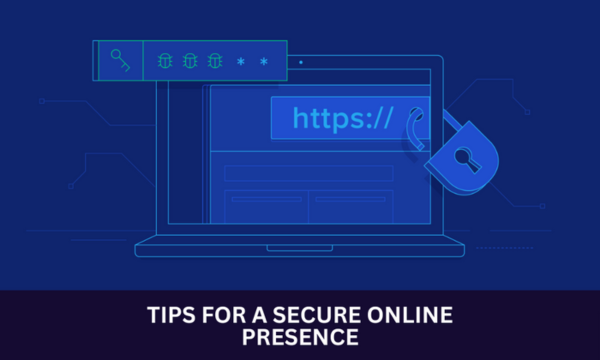In today’s digital landscape, the importance of website security cannot be overstated. Whether you run a personal blog, an e-commerce store, or a corporate website, ensuring the security of your online presence is paramount. With cyber threats on the rise, website owners must be proactive in safeguarding their websites and protecting sensitive data. In this blog post, we’ll explore why website security is crucial and provide valuable tips to help you establish a secure online presence.

Why Website Security Matters
1. Protecting User Data
One of the primary reasons for prioritizing website security is safeguarding user data. Whether you collect personal information for registration, purchases, or subscriptions, it’s your responsibility to ensure that this data is stored and transmitted securely. A breach can lead to severe consequences, including legal and financial repercussions, as well as damage to your reputation.
2. Preventing Downtime
Security breaches, such as DDoS attacks or malware infections, can lead to website downtime. Downtime disrupts user access, causing inconvenience and potential revenue loss for businesses. A secure website is less vulnerable to such attacks, helping maintain uninterrupted service.
3. Enhancing User Trust
A secure website builds trust with your visitors. When users see trust indicators like SSL certificates (visible as “https://” in the browser’s address bar), they are more likely to engage with your site, share personal information, and complete transactions.
4. Improving Search Engine Ranking
Search engines, such as Google, consider website security when ranking search results. Secure websites with SSL certificates receive a slight SEO boost. Conversely, unsecured websites may receive warnings or lower rankings, impacting organic traffic.
Tips for a Secure Online Presence
Now that we understand the importance of website security let’s explore practical tips to establish a secure online presence:
1. Use HTTPS
Implement HTTPS (Hypertext Transfer Protocol Secure) to encrypt data between your website and users’ browsers. This encryption ensures that sensitive information, like login credentials and payment details, remains private during transmission. Obtain an SSL certificate from a trusted certificate authority to enable HTTPS on your site.
2. Keep Software and Plugins Updated
Outdated software, including content management systems (e.g., WordPress, Joomla) and plugins, can be vulnerable to security exploits. Regularly update your website’s software and plugins to patch vulnerabilities and reduce the risk of attacks.
3. Implement Strong Password Policies
Enforce strong password policies for all user accounts on your website, including administrators and customers. Encourage the use of complex, unique passwords and consider implementing two-factor authentication (2FA) for added security.
4. Conduct Regular Backups
Frequent backups are your safety net in case of data loss or security breaches. Set up automated backups of your website’s files and databases. Store backups securely, ideally offsite, to prevent loss during server failures or attacks.
5. Install Security Plugins
If you’re using a content management system (CMS) like WordPress, leverage security plugins. These tools can help monitor your website for suspicious activity, block malicious traffic, and strengthen your site’s security.
6. Perform Security Audits
Regularly audit your website’s security. This includes vulnerability scanning, penetration testing, and code review. Identify and address potential weaknesses before attackers exploit them.
7. Monitor Website Activity
Implement continuous monitoring for your website. This involves tracking login attempts, file changes, and server access. Unusual or suspicious activity can be detected and addressed promptly.
8. Educate Your Team
If you have a team managing your website, ensure they are well-educated about security best practices. Conduct training sessions to raise awareness of potential threats and how to respond to them.
9. Stay Informed
Stay informed about the latest security threats and trends. Subscribe to security newsletters, follow trusted cybersecurity blogs, and keep your knowledge up to date. Awareness is a vital aspect of website security.
10. Have an Incident Response Plan
Prepare for the worst-case scenario by developing an incident response plan. Define steps to take in case of a security breach, including communication with affected parties and law enforcement if necessary.
Conclusion
In an increasingly interconnected world, website security is non-negotiable. Protecting user data, preventing downtime, and building trust with visitors are just a few reasons why security should be a top priority for website owners. By following these tips and investing in security measures, you can establish a robust and secure online presence that not only safeguards your data but also builds trust with your audience. Remember, when it comes to website security, prevention is key.
